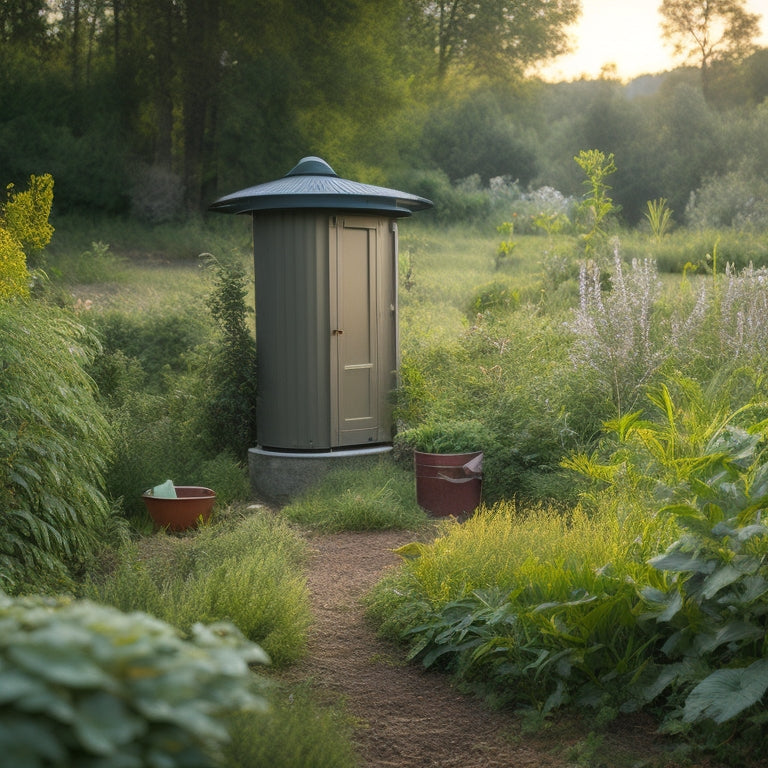
What Makes Composting Toilets Ideal for Off-Grid Living?
Share
As you opt for off-grid living, you're likely aware that traditional toilets are a significant drain on your precious water resources. Composting toilets offer a game-changing solution, eliminating water usage while providing a sustainable and eco-friendly alternative. With minimal maintenance, compact designs, and odorless waste disposal, these toilets conserve space and reduce your environmental footprint. Plus, they create nutrient-rich compost for your off-grid garden. By integrating composting toilets into your setup, you'll not only reduce water consumption but also promote energy independence and self-sufficiency. Now, uncover how these innovative systems can further enhance your off-grid lifestyle.
Key Takeaways
- Composting toilets conserve water by eliminating the need for flushing, making them ideal for off-grid living where water is scarce.
- They require minimal maintenance, reducing cleaning schedules and resource allocation, and promoting sustainable living practices.
- Compact designs and optimized waste storage enable composting toilets to fit discreetly in limited spaces, conserving floor space and enhancing self-sufficiency.
- Composting toilets create nutrient-rich compost through efficient decomposition, providing a valuable resource for off-grid gardening and enhancing food security.
- By reducing water usage and eliminating sewage treatment needs, composting toilets promote energy independence and lower energy costs, supporting eco-friendly practices.
Water Conservation Advantage
With water scarcity becoming an increasingly pressing concern, off-grid homesteaders are keenly aware of the need to conserve this precious resource.
You understand the importance of reducing your environmental impact and adopting sustainable practices. Composting toilets offer a noteworthy water conservation advantage, as they don't require a constant supply of water for flushing. This is particularly essential in off-grid settings where access to water may be limited.
By using composting toilets, you'll appreciably reduce your water usage, minimizing your reliance on this important resource.
Additionally, integrating renewable energy sources, such as solar-powered fast charging, can enhance your off-grid self-sufficiency. This not only benefits the environment but also enhances your independence and self-sufficiency, allowing you to thrive in off-grid living situations.
Low Maintenance Requirements
You'll appreciate the low maintenance requirements of composting toilets, which allow you to establish an easy cleaning schedule that fits your needs.
Moreover, the reduced water usage of these systems means you'll spend less time and resources on maintenance tasks.
By leveraging fast charging infrastructure, you can allocate more resources to your off-grid lifestyle.
In addition, with solar-powered charging solutions, you can reduce your reliance on traditional power sources.
With less odor production, you'll also spend less time dealing with unpleasant smells and more time enjoying your off-grid lifestyle.
Easy Cleaning Schedule
Maintaining a composting toilet requires a structured cleaning schedule to confirm peak performance and hygiene.
You'll need to establish a regular cleaning frequency to prevent buildup and odors. Typically, this involves adding bulking agents like coconut coir or sawdust to the composting chamber daily, and turning the pile weekly to confirm aeration and decomposition.
Additionally, you'll need to perform deeper maintenance tasks, such as emptying the composting chamber and cleaning the toilet seat, on a monthly basis.
Reduced Water Usage
Embracing a composting toilet means greatly reducing your water usage, an essential aspect of off-grid living. Traditional toilets use a significant amount of water with each flush, which can be a major concern when relying on rainwater harvesting or wells. In contrast, composting toilets use little to no water, making them an ideal choice for sustainable practices.
| Toilet Type | Water Usage per Flush | Environmental Impact |
|---|---|---|
| Traditional | 1-3 gallons | High water consumption, wastewater generation |
| Low-Flow | 0.8-1.6 gallons | Lower water consumption, still generates wastewater |
| Composting | 0 gallons | Zero water consumption, minimal wastewater |
Less Odor Production
Composting toilets' waterless design not only conserves this precious resource but also reduces another significant concern: odor production. Since you're not flushing away waste with water, you'll notice a significant decrease in unpleasant smells.
This is because composting toilets rely on aerobic decomposition, which breaks down waste efficiently and minimizes odor control issues. As fleets shift to clean energy solutions, such as solar power, to reduce their carbon footprint, it's crucial to explore innovative solutions for waste management, like composting toilets renewable fuel source.
By adopting sustainable practices, individuals can contribute to a greener future. Carbon-rich materials like sawdust or coconut coir absorb excess moisture, reducing the environment where odors thrive.
The toilet's design promotes airflow, ensuring that oxygen reaches the waste and supports aerobic decomposition. Regular maintenance, such as turning the compost, helps maintain ideal conditions for odor-free decomposition.
Space Efficiency Benefits
You'll appreciate the space-saving advantages of composting toilets, particularly when living off-grid where every square foot counts.
By adopting sustainable fuel options fuel efficiency tracking, you can reduce your carbon footprint and make the most of your space.
Compact toilet designs allow for discreet installation in small areas, such as tiny homes or cabins.
Additionally, optimized waste storage systems enable efficient use of space, reducing the overall footprint of the toilet system.
Compact Toilet Designs
Space-conscious off-gridders often face a formidable challenge: finding a toilet that's both functional and compact. You need a toilet that can fit snugly in your off-grid abode without sacrificing performance.
Fortunately, composting toilets have evolved to address this issue. Many modern designs incorporate innovative materials and ergonomic features that make them ideal for small spaces. By optimizing energy production with strategically oriented solar panels Optimize Your Solar Panel Array, you can further reduce your carbon footprint. Additionally, selecting energy-efficient equipment can minimize losses and reduce operating costs.
Some notable features of compact composting toilets include:
- Slim profiles that can fit into tight corners or against walls
- Wall-mounted designs that save floor space
- Compact footprints that can fit in tiny bathrooms or outhouses
These innovative designs guarantee that you can enjoy the benefits of composting toilets without sacrificing precious space in your off-grid home.
Optimized Waste Storage
Effective waste storage is a critical component of any composting toilet system, and optimized designs can greatly reduce the overall footprint of the toilet. You'll want to take into account waste segregation techniques that separate liquids from solids, reducing the volume of waste that needs to be stored. This approach allows for more efficient composting and minimizes the risk of contamination.
| Feature | Benefit | Space Savings |
|---|---|---|
| Vertical storage | Maximizes floor space | Up to 50% |
| Modular design | Allows for easy expansion | Up to 30% |
| Aeration systems | Reduces moisture, odor, and volume | Up to 20% |
| Insulation and climate control | Regulates temperature, minimizing decomposition time | Up to 15% |
| Automated mixing and aeration | Guarantees consistent composting conditions | Up to 10% |
Odorless Waste Disposal
Frequently, composting toilet users are concerned about unpleasant odors emanating from their waste disposal system. You may wonder how to maintain an odorless waste disposal process. The key lies in understanding the principles of waste decomposition.
When done correctly, composting toilets can break down waste efficiently, minimizing unpleasant smells.
To achieve odorless waste disposal, consider the following:
-
Guarantee adequate aeration and oxygen supply to facilitate aerobic decomposition, reducing anaerobic conditions that cultivate odor-causing bacteria.
-
Maintain a balanced carbon-to-nitrogen ratio, which promotes efficient decomposition and minimizes ammonia production, a common odor culprit.
-
Regularly empty and turn the composting mixture to prevent matting and anaerobic pockets, allowing for uniform decomposition and reducing the risk of unpleasant odors.
Nutrient Rich Compost Creation
As you successfully maintain an odorless waste disposal process, you can now focus on creating a nutrient-rich compost that will become a significant resource for your off-grid garden. This compost is the result of microbial activity breaking down organic matter, releasing crucial nutrients for your crops. To optimize this process, it's important to maintain the right balance of carbon-rich "brown" materials and nitrogen-rich "green" materials.
| Material | Carbon-to-Nitrogen Ratio | Function |
|---|---|---|
| Food scraps | 10:1 to 20:1 | Green material, high in nitrogen |
| Dried leaves | 50:1 to 100:1 | Brown material, high in carbon |
| Shredded newspaper | 170:1 to 200:1 | Brown material, high in carbon |
| Human waste | 10:1 to 20:1 | Green material, high in nitrogen |
Energy Independence Achieved
By incorporating a composting toilet into your off-grid system, you've successfully severed your reliance on public water and sewage infrastructure, effectively achieving energy independence.
This is an essential step towards self-sufficiency, as you'll no longer be tied to the grid for your sanitation needs. With a composting toilet, you'll reduce your energy consumption and carbon footprint, embracing sustainable practices and eco-friendly solutions.
Some key benefits of energy independence with composting toilets include:
- Reduced water usage, as composting toilets don't require a constant water supply
- Lower energy costs, as there's no need for sewage treatment or pumping
- Increased autonomy, as you're no longer reliant on public utilities
Seamless Integration Possibilities
Your composting toilet system can be seamlessly integrated into your off-grid setup, allowing you to maximize its benefits while minimizing its footprint.
This integration is made possible by design flexibility, which enables you to customize the system to fit your specific needs and space constraints. You can choose from various installation options, such as in-floor or above-floor configurations, to optimize the system's performance and aesthetics.
Additionally, many composting toilet systems are designed to be modular, allowing you to easily add or remove components as needed. This flexibility guarantees that your composting toilet system can adapt to your changing needs, providing you with a reliable and efficient solution for waste management in your off-grid home.
Frequently Asked Questions
Can Composting Toilets Be Used in Cold Climates?
As you venture into the frozen wilderness, you wonder if composting toilets can thrive in the harsh cold. Yes, they can! With cold climate adaptations, such as insulated designs and winter maintenance routines, you'll be free to live off-grid, even in the chilliest of temperatures.
Are Composting Toilets Suitable for Households With Many Users?
You're wondering if composting toilets can handle multiple users; the answer lies in user experience and user capacity. Look for models with large enough chambers and efficient aeration to guarantee a smooth experience, even with frequent use.
Do Composting Toilets Require Frequent Emptying?
You'll find that composting toilets don't require frequent emptying, as the composting process breaks down waste efficiently, allowing for a slower frequency of emptying, typically every 1-3 months, depending on usage and model type.
Can I Install a Composting Toilet Myself?
You can install a composting toilet yourself, but it's essential to follow the manufacturer's instructions and DIY tips to guarantee a successful installation process, avoiding costly mistakes and potential health hazards.
Are Composting Toilets Compatible With Septic Systems?
You're wondering if composting toilets can coexist with septic systems; the answer lies in local regulations. While some areas permit connections, others restrict it. Research your region's composting toilet regulations to guarantee a harmonious, off-grid setup that meets septic system compatibility standards.
Related Posts
-

3 Best Eco-Grants for Home Energy Upgrades
You're eligible for various eco-grants that can help you cut down on energy bills and reduce your carbon footprint by...
-

How to Upgrade Your Home With Geothermal Innovations
You're now on the cusp of utilizing the Earth's natural thermal energy to revolutionize your home's heating and cooli...
-

3 Earth-Loving Furniture Tips for Energy-Smart Homes
When furnishing your energy-smart home, you have the power to reduce your carbon footprint greatly by making consciou...


